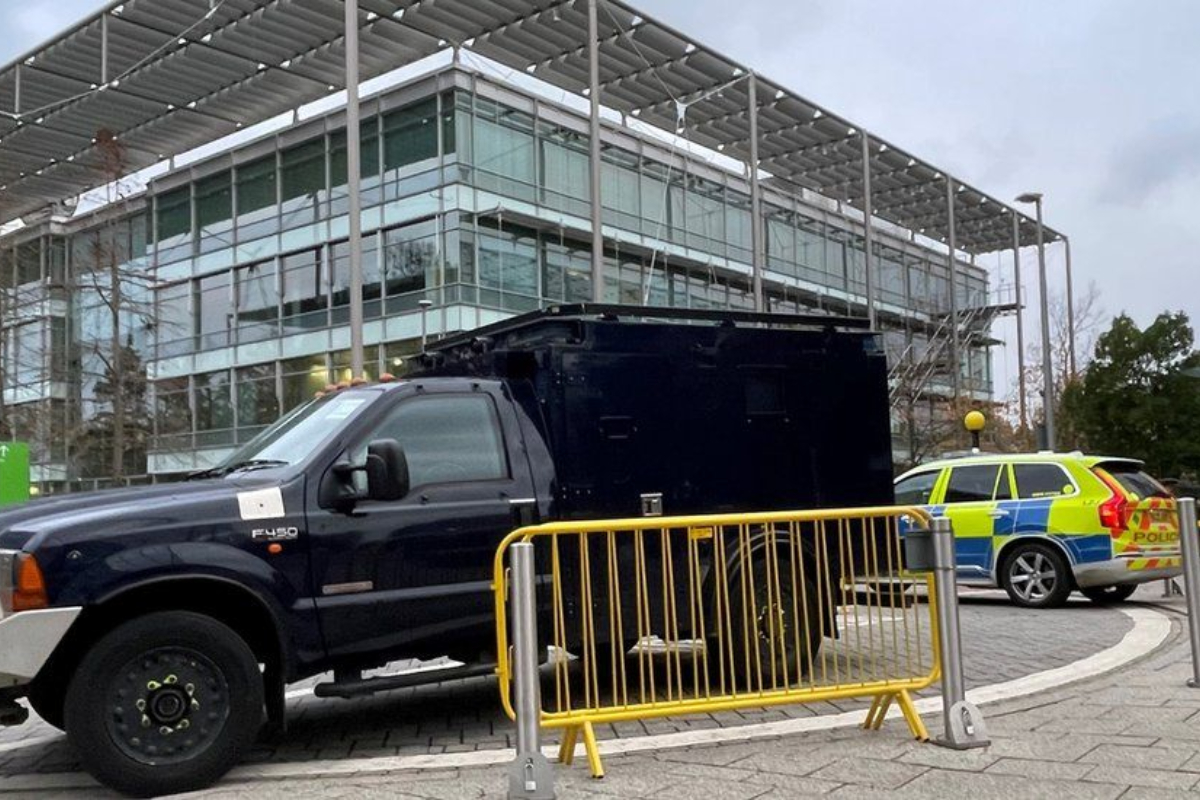- Armed police man every entrance to Iran International’s offices in Chiswick, west London.
- The news outlet has angered the Iranian government with its Farsi-language news coverage.
- UK intelligence overheard planning conversations for actual strikes on Iran, according to reports.
West London’s Chiswick neighborhood has a lot of armed police present in a business park that is bordered by trees.
Alongside the Met Police armed response vehicles, which are both fully staffed with armed cops inside, are rows of black, multi-purpose armored trucks known as Jankels.
They are manning every entrance to the plate-glass structure that houses Iran International’s offices, an independent Farsi-language news outlet that has angered the Iranian government.
“This has to be the biggest armed police operation around a commercial building in this country that I can think of,” says a spokesman for Iran International.
It unmistakably reminds one of Tony Blair’s dispatch of armored vehicles to Heathrow in reaction to a feared terrorist attack in February 2003.
Since the death in police custody of 22-year-old Mahsa Amini, who was purportedly detained for improperly donning her hijab head covering, it has been broadcasting continuous 24-hour news coverage of the massive street protests that have gripped Iran.
[embedpost slug=”iran-police-shoot-at-mourners-for-mahsa-amini/”]
Numerous demonstrations have demanded an end to the Islamic Republic’s repressive regime.
The Iranian government, however, has detained thousands of people rather than giving in to popular demands and has accused Western countries and the free press they support of inciting instability and igniting riots.
So far, so accustomed. Every time there have been protests in Iran, that has been the refrain, but this time is different.
The Iranian Revolutionary Guards Corps, the real power behind the regime, has started targeting Iranian opposition journalists based in Britain in addition to the fact that the protests are becoming substantially more broad.
“Iran projects threat to the UK directly, through its aggressive intelligence services,” says Ken McCallum, the director-general of MI5, the UK security service.
“At its sharpest, this includes ambitions to kidnap or even kill British or UK-based individuals perceived as enemies of the regime. We have seen at least 10 such potential threats since January alone.”
James Cleverly, the foreign secretary, has urged Iran to stop intimidating journalists working in the UK. The claims have been deemed “ridiculous” by Iran.
The Metropolitan Police, in close collaboration with MI5, has responded to the threats by putting on a significant display of force to defend the about 100 employees of Iran International in Chiswick, some of whom have personally received death threats.
“The Met Police have been outstanding”, the Iran International spokesman tells me as we sit in an office next to their newsroom. “Their response has been swift and effective.”
So, exactly what form do these dangers take?
At first, these were merely text messages sent to the journalists’ cell phones, frequently threatening them with dire consequences if they continued to write critical articles about the dictatorship.
According to reports, this has apparently been going on for years, with targets including Iran International , to the point where Iran’s behavior has been brought up at the UN.
However, Iran has advanced this year.
It appears that UK intelligence has overheard planning conversations for actual strikes. Additionally, hostile surveillance has been seen outside Iran International’s offices and several of its staff members’ residences.
“We’re talking here about low-grade Tier 3 operatives being hired and directed by Tier 1 operatives,” says the Iran International spokesman.
“They are easily recruited from drug gangs or from the fringes of an Islamic center.”
He claims that hostile spying hasn’t always been so advanced. One illustration he provides is of a group of three people pushing a stroller up and down the sidewalk in front of the building around 11 p.m. on a chilly evening.
“Who takes a baby in a pram for a walk at that time of night?”
Along with the typical cyber activities, there have been unsuccessful attempts to obstruct Iran International’s satellite broadcasts.
He displays a text message to me from a worker who has just been informed of attempts to break into his Twitter account. Then our meeting ends abruptly.
“I’ve got two protective security officers coming in from the Met to discuss what more still needs to be done,” he tells me.
“This problem is not going away.”
[embedpost slug=”met-police-chief-says-some-officers-shouldnt-speak-publicly/”]





















